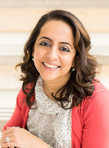Panelist at SIO2022
Last week (21 Oct ’22) I traveled to Phoenix AZ to speak at the 19th International Conference held by the Society for Integrative Oncology. I was a panelist, along with two accomplished women – Kavita Mishra, a radonc and professor at UCSF and Linda Larkey a PhD and also a professor at ASU. The host for our session was AnaMaria Lopez MPH, MD, an oncologist at Jefferson Health. The topic was Mind-Body Medicine.

I titled my talk ‘The C-Word’ and I had a three asks from the cancer care providers in the audience and online.
My first ask: Tune into Cultural Sensitivity
Depending on where the patient is from; their ethnicity and familial background can make it difficult or downright shameful to talk about the disease. I shared some examples of this stigma – Survey showed that 53% of Indians are likely to agree that people with cancer brought it on themselves. In Mexico, cancer may be seen as a punishment. In parts of South Africa cervical cancer is highly stigmatized because the cervix is “part of the body you don’t speak about.” The more knowledgeable cancer caregivers are about cultural biases the better they will be at understanding the patient. This can shed light on whether the patient is being well supported by the community or if they are suffering in silence. The care team can use this information to tailor support and channel resources accordingly.
My next ask from the caregivers was to create a safe space free of toxic positivity. I sighed over the numerous times people reminded to “stay positive” during treatment. If positive thinking could wish away my chemo I would be OD-ing on optimism. I told SIO attendees how validated I felt when my oncologist let me lament over my hair loss unlike others around me who found it imperative to remind me that “it’ll grow back”.
The other example of toxic positivity I shared was a story about my friend in Peoria IL. This mother to 6 yo twin boys was recently diagnosed. She had a list of questions for her oncologist, rightfully so. Not even half way through her questions the oncologist told her to “not worry so much”. There was an audible gasp from the audience. I went on to say that fear, anger, anxiety, hope, relief, sorrow, hopeless, joy and everything in between; are the gamut of emotions us survivors are allowed to have. And it is no one’s place to placate our journey. The audience applauded.
I then went from past tense to present as I told the SIO attendees that the chase for the silver lining doesn’t with treatment. I talked about getting approached by people who want to hear about the lessons cancer has taught me and how beautiful my life is now that I’m on the other side. The problem is my life was rainbows, before cancer. I lived a life untainted, felt unbridled joy, danced unapologetically. Cancer broke a part of me… mid-sentence I choked up. I was not anticipating this wave of emotion. What is this lump in my throat? I’m on stage! Keep it together! In a quivering voice I stated that I will never be thankful for cancer. I shared what I was grateful for; the poisonous chemo and the gentle healing beam of radiation that has rendered me disease-free. And I was grateful for the glue that held it all together, an oncology team that did not mandate toxic positivity.
There was applause again, I think? It’s a blur because I was still recovering from the loss of control.
Not all was lost though, I managed to end strong with my last ask. I suggested that as caregivers, this group should give their patient a heads up that survivorship is a struggle in it’s own right. After months of grueling treatment when I was on my last day of radiation it hit me; I wasn’t ready to be cut off from the Cancer Center. How do I go from fighting for my life to sitting in a conference room discussing engine controls? You see for months a group of highly specialized medical professionals watched me like a hawk, and now what? I’m free to fly? I wish I had known the complex and contradictory emotions a patient can have at the end of treatment.

I concluded with a few lighthearted words admitting that I’m proficient at dishing out unsolicited yet deeply personal advice. I ended with a “you’ve been a great audience” as I joined my hands in prayer as a non-verbal but genuine thank you. I am certain I made an impact however small it may be. I reached people, opened their eyes to cultural bias associated with cancer or echoed their sentiments on toxic positivity. I am so humbled I got this opportunity.
This series of posts are like Star Wars Episodes, we won’t be following linear logic. I will next write about how I was introduced, what I shared about my journey and the expert panelists. And follow that up with the overall conference experience. Stay tuned!



